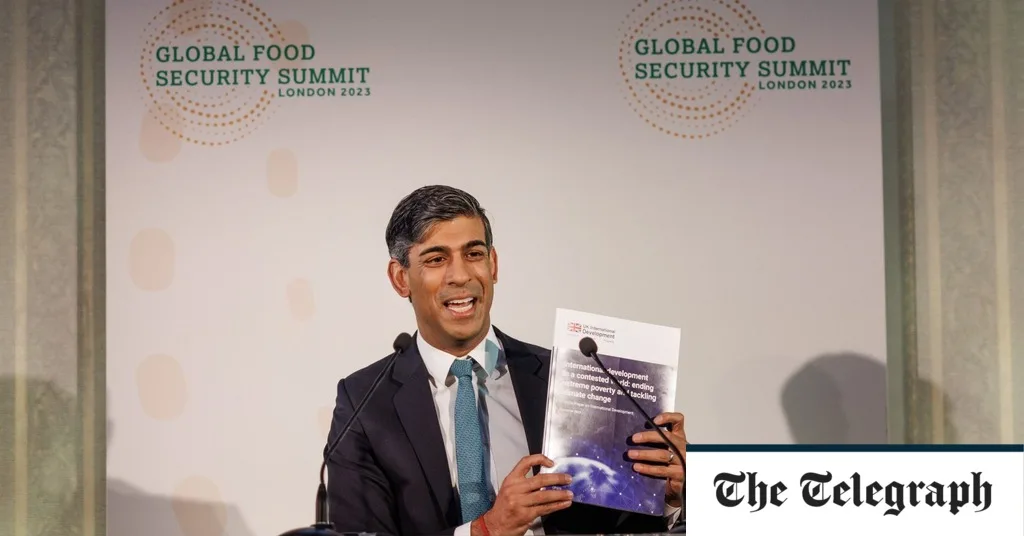
Britain must act with “humility” and “acknowledge our past” when providing foreign aid, the Government has said.
Ministers believe the UK must shift from an “outdated ‘donor-recipient’ model” to one of “mutual respect”.
In its new International Development white paper, the Government says the UK recognises it has “much to learn, as well as much to offer” when it comes to driving “positive change” abroad.
It will now focus on building “equitable” partnerships rooted in “patient diplomacy”, giving local leaders a voice in “shaping the solutions they want to see, rather than accepting the ones we think they need”.
The policy plan, launched on Monday to coincide with the Global Food Security Summit, says British people can be proud of their part in boosting development overseas, with their generosity “demonstrated worldwide”. But it says a change in approach is needed.
‘Focus on mutual respect’
“A focus on mutual respect will put patient diplomacy and development into practice,” it says.
“It will build long-term reliable and equitable partnerships that work towards common development objectives.
“It will move us beyond an outdated ‘donor-recipient’ model. We will engage with humility and acknowledge our past.”
It is unclear what is meant by Britain acknowledging its past, and how this is relevant to its international development policy. The Foreign Office refused to provide further details.
However, it is understood the phrase is intended to reflect the importance of working in a spirit of genuine partnership and understanding.
For years, the UK has resisted pressure to pay reparations for its historical links to slavery.
The issue came to the fore again in May, when indigenous leaders from 12 Commonwealth countries demanded that the King apologise for what they described as centuries of “genocide and colonisation”.
Issue of reparations
They urged Britain to begin the process of reparations and to return stolen artefacts and human remains kept in museums and archives.
The Government has also faced calls for “reparatory justice” from the opposition benches, with Labour MP Clive Lewis urging ministers to compensate Caribbean countries for Britain’s role in the slave trade.
It is understood that the white paper was not alluding to reparation plans. The Government’s position is that the best way for the UK to respond to the wrongs of the past is to ensure that current and future generations learn from history.
Elsewhere, the document says Britain has a responsibility to “acknowledge its role in the international system”.
It also suggests artificial intelligence could be used to predict wars years in advance and respond “more pre-emptively” to extreme weather events.
“Foresight capability and systems should be strengthened to enable early action,” it says.
“Drawing on ground-breaking data science, AI, machine learning and open-source intelligence capabilities, the UK and its partners are entering new territory in our ability to forecast complex risks.
“New technology should be used to expedite forecasting of conflict and mass atrocity risks, extending the length of time from a few months to a few years in advance, buying time for response.”
White paper praised
The white paper was pulled together by Foreign Office minister Andrew Mitchell and hailed on Monday by Rishi Sunak and his new Foreign Secretary, Lord Cameron.
Appearing at the Global Food Security Summit in London, in his first major speaking engagement since his shock return to frontline politics, the former prime minister said he would “put development right back at the heart” of the Foreign Office.
The policy plan is underpinned by the shelving of Lord Cameron’s flagship pledge to spend 0.7 per cent of GDP on foreign aid, part of his modernisation project as Tory leader.
The change was written into law in 2015. But Mr Sunak, when Chancellor, quietly suspended the target, instead vowing to contribute 0.5 per cent and return to 0.7 per cent only when government debt began to fall.
Outlining Britain’s position on international development, the paper says: “We will build on UK strengths and shift our approach to partnerships, prioritising mutual respect.
“We will take a long-term approach. We will be more locally-led. We will bring the best of what the UK has to offer, including the breadth and depth of our global network, and support partners where they can lead.”
It says low and middle-income countries “rightly demand” that the UK respects their priorities for development.
This means it is necessary to form relationships “fit for the 21st century” that are “not defined by aid”, with delivery led by local people, especially marginalised groups.


